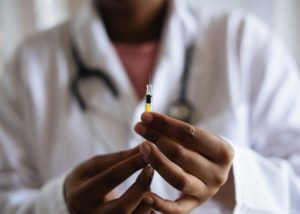A COVID-19 vaccine based on an inactivated version of coronavirus has been shown to be safe and able to cause an immune response in more than 600 healthy adult patients, The Lancet Infectious Diseases journal has found

All participants in the early stage trial in China developed antibodies, and no one developed a severe reaction in the month after getting the jab.
The study included participants aged between 18 and 80 years, and found that antibody responses were induced in all recipients. Participants aged 60 and over were slower to respond, taking 42 days before antibodies were detected in all recipients compared with 28 days for participants aged 18-59. Antibody levels were also lower in those aged 60-80 years compared with those aged 18-59.
The trial was not designed to assess efficacy of the vaccine, so it is not possible to say whether the antibody responses induced by the vaccine, called BBIBP-CorV, are sufficient to protect from SARS-CoV-2 infection.
“Protecting older people is a key aim of a successful COVID-19 vaccine as this age group is at greater risk of severe illness from the disease,” says Professor Xiaoming Yang, one of the authors of the study, from the Beijing Institute of Biological Products Company Limited.
“However, vaccines are sometimes less effective in this group because the immune system weakens with age. It is therefore encouraging to see that BBIBP-CorV induces antibody responses in people aged 60 and older, and we believe this justifies further investigation.”
There are currently 42 vaccines for COVID-19 in clinical trials. These vary in type and include DNA plasmid vaccines, inactivated virus vaccines, adenovirus-vectored vaccines, RNA vaccines, protein subunit vaccines and virus-like particle vaccines. Some of these have already been shown to be safe and to elicit immune responses in early phase clinical trials.
The BBIBP-CorV vaccine used in the study reported here is based on a sample of the virus that was isolated from a patient in China. Stocks of the virus were grown in the lab using cell lines and then inactivated using a chemical called beta-proprionolactone. BBIBP-CorV includes the killed virus mixed with another component, aluminium hydroxide, which is called an adjuvant because it is known to boost immune responses.
The first phase of the study was designed to find the optimal safe dose for BBIBP-CorV. It involved 96 healthy volunteers aged between 18 and 59 years and a second group of 96 participants aged between 60 years and 80 years. Within each group, the vaccine was tested at three different dose levels (2mg, 4mg and 8mg, 24 participants per group), with two vaccinations administered on day 0 and 28. A fourth group within each age group (24 participants in each age group) were given two doses of a placebo vaccine. In total, in phase 1 of the study, 144 participants received the vaccine and 48 received the placebo.
The second phase of the study was designed to identify the optimal timing schedule for vaccination. 448 participants aged between 18 and 59 years were randomly assigned to receive either one 8mg shot of vaccine or placebo, or two shots of 4mg vaccine or placebo (at 0 and 14 days, 0 and 21 days or 0 and 28 days). In this second phase, there were 112 participants per group, with 336 receiving the vaccine, and 112 receiving the placebo.
Participants were asked to report any adverse events for the first seven days after each vaccination and these were verified by the research team. Thereafter, participants recorded any adverse events using paper cards for the following 4 weeks. During phase 1, laboratory tests were carried out after the first and second vaccinations to assess kidney function, liver function and other organ functions. Blood samples were taken to test antibody levels for SARS-CoV-2 before and after vaccination.
No serious adverse events were reported within 28 days of the final vaccination. The most common side effect was pain at the injection site (phase 1 results: 24% [34/144] of vaccine recipients, vs 6% [3/48] of placebo recipients). A small number of participants reported experiencing a fever (phase 1 results: 4% [5/144] of vaccine recipients, vs 6% [3/48] of placebo recipients). There were no instances of clinically significant changes in organ functions detected in laboratory tests in any of the groups.
The greatest antibody responses were elicited by two 4mg doses of the vaccine at either days 0 and 21 or 0 and 28 (Mean neutralising antibody titres 28 days after second vaccination were 282.7 for two 4mg injections at day 0 and 21, and 218.0 for two 4mg injections at day 0 and 28).
“Our findings indicate that a booster shot is necessary to achieve the greatest antibody responses against SARS-CoV-2 and could be important for protection,” says Professor Xiaoming Yang.
The authors noted some limitations with the study, including the short duration of follow up at just 42 days. They also highlighted that the study did not include children and adolescents aged under 18. Trials with these groups will be carried out when the full analysis of data from adult groups is completed, the researchers say.
This trial was not meant to study how effective the vaccine was at preventing COVID-19 infection, and the study team says more research will be needed to understand how children respond to the vaccine candidate.



